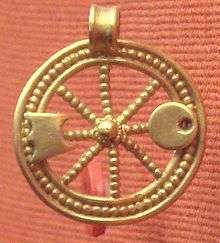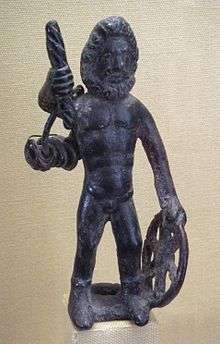Iouga
Iouga is a suggested reconstruction of the name of a Romano-British goddess known from a single fragmentary inscription on an altar-stone at York. The name appears as Ioug[...] or Iou[...] on the damaged stone, which reads:
- To the numina of the Emperor(s) and to the goddess Iou[..], [..]sius (built/restored) a (half?) part of a temple.
Reading the fragmentary name as Ioug[...], Roger Wright proposed the reconstructed form Iouga, which he linked with the Proto-Celtic *jugā meaning 'yoke'. However, Theresia Pantzer, reviewing the stone, suggests that what Wright had perceived as traces of a letter g was merely "damage to the stone rather than part of a letter".[2] The goddess is otherwise unknown.[3]
References
- ↑ RIB 656. The stone is now at the Yorkshire Museum.
- 1 2 Theresia Pantzer (2008). "RIB 656".
- ↑ Colin Smith. "Vulgar Latin in Roman Britain". In Aufstieg und Niedergang der römischen Welt, II.29.
This article is issued from
Wikipedia.
The text is licensed under Creative Commons - Attribution - Sharealike.
Additional terms may apply for the media files.

